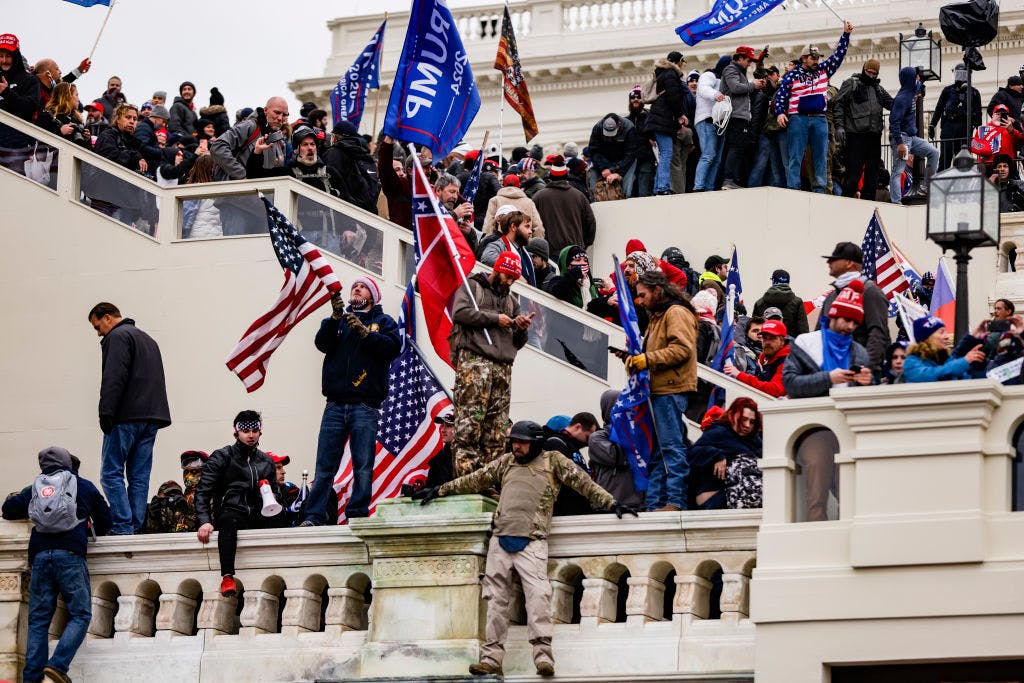Why Is the Justice Department Charging January 6 Rioters Under a Law on Accounting Fraud?
The Supreme Court wants to know, since the protesters who stormed the Capitol had nothing to do with — and were not accused of — financial skullduggery.

Americans will hear tomorrow the Supreme Court weigh what could yet be a scandal. At issue in Fischer v. United States is the charging of more than 350 January 6 defendants — including President Trump — with violations of the Sarbanes-Oxley Act. Originally intended to combat financial fraud, the law proved attractive to prosecutors because its violation can draw 20 years. The Nine could find its use an instance of overreach.
The law, known in the Senate as the “Public Company Accounting Reform and Investor Protection Act,” is intended to “protect investors by improving the accuracy and reliability of corporate disclosures made pursuant to the securities laws.” The January 6 riot, though, had nothing — nothing — to do with accounting and investor protection. It was a riot ignited by protesters trying to enter the Capitol to challenge the vote count.
Those rioters aren’t what Sarbanes-Oxley is about. It is a law designed to punish accountants and auditors, financial executives and companies. Is it, though, applicable to crimes that are unrelated to financial misdeeds? The defendant in this case, Joseph Fischer, maintains that the riders of the D.C. circuit erred in finding that the law is applicable. We’ve called it “an abuse to use Sarbanes-Oxley in pursuing those who rioted on January 6.”
The law bans “corruptly obstructing, influencing, or impeding an official proceeding, or attempting to do so.” Passed after the implosions of WorldCom and Enron, it cites anyone who “alters, destroys, mutilates, or conceals a record.” A district court judge, Carl Nichols, reasoned that the law “requires that the defendant have taken some action with respect to a document, record, or other object.” Yet the riots were not about financial shenanigans.
While such a reading could conceivably be at least argued in respect of Mr. Trump — Special Counsel Jack Smith has charged him with schemes involving paper — it would be harder to sustain in relation to rioters like Fischer. We noted last year that even one judge who eventually sided with the government, Amit Mehta, wondered whether this was an “appropriate” use of prosecutorial discretion. He likened it to the DOJ declaring “Trust us.”
The justices will tease out whether the government’s efforts to use the financial law is a bridge too far, or whether its language as drafted can be applied in a different context. The Supreme Court is no stranger to striking down laws for failings of language. Vagueness, say, is seen as running afoul of a defendant’s due process right to notice. The issue of fair warning for a statute hauled in from left field could be raised by Fischer during oral arguments.
Eschewing Sarbanes-Oxley does not mean letting rioters off scot* free. Everyone charged under the 2002 law is also charged with other crimes. Fischer, say, has pleaded guilty to assault, disorderly conduct, and “parading, demonstrating, or picketing in a Capitol Building.” January 6 was egregious enough that prosecutors could find in the criminal code the charges to punish its perpetrators without recourse to esoteric and unrelated financial regulations.
That is the point made in an amicus brief docketed by, among others, Senator Cotton and Representative Jim Jordan. They accuse the DOJ of using Sarbanes-Oxley as an “all-purpose weapon against perceived political opponents.” Mr. Trump, in his own brief, reckons that the provision has been “stretched far beyond its natural meaning.” Fischer himself warns of the “creation of an omnibus obstruction offense for prosecutors to use in future cases.”
The government contends that “corruptly obstructing, influencing, or impeding an official proceeding” is apt. It adds that it is “natural to say that a defendant obstructs an official proceeding by physically blocking it from occurring.” This happened, the Biden administration argues, when Fischer and others “violently occupied the Capitol for several hours” and prevented, for a time, Congress from doing its work of certifying the vote.
Sarbanes and Oxley would be turning over in their graves. Not to put the gloss on January 6. Just as justice requires the punishment to fit the crime, so too does the crime need to fit the action. Now, hundreds risk being convicted under a charge that they argue was never intended to cover them, one that bears a penalty more draconian than any charged save seditious conspiracy. If this isn’t ripe for review, it’s hard to imagine what is.
__________
* From, one website reports, the Scandinavian “skat,” meaning “tax.”

